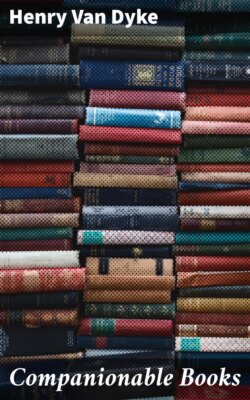Читать книгу Companionable Books - Henry Van Dyke - Страница 13
На сайте Литреса книга снята с продажи.
POETRY IN THE PSALMS
ОглавлениеTable of Contents
There are three ways in which we may read the Bible.
We may come to it as the divinely inspired rule of faith and conduct. This is the point of view from which it appears most precious to religion. It gives us the word of God to teach us what to believe and how to live.
We may consider it as a collection of historical books, written under certain conditions, and reflecting, in their contents and in their language, the circumstances in which they were produced. This is the aspect in which criticism regards the Bible; and its intellectual interest, as well as its religious value, is greatly enhanced by a clear vision of the truth about it from this point of view.
We may study it also as literature. We may see in it a noble and impassioned interpretation of nature and life, uttered in language of beauty and sublimity, touched with the vivid colours of human personality, and embodied in forms of enduring literary art.
None of these three ways of studying the Bible is hostile to the others. On the contrary, they are helpful to one another, because each of them gives us knowledge of a real factor in the marvellous influence of the Bible in the world.
The true lover of the Bible has an interest in all the elements of its life as an immortal book. He wishes to discern, and rightly to appreciate, the method of its history, the spirit of its philosophy, the significance of its fiction, the power of its eloquence, and the charm of its poetry. He wishes this all the more because he finds in it something which is not in any other book: a vision of God, a hope for man, and an inspiration to righteousness which seem to him divine. As the worshipper in the Temple would observe the art and structure of the carven beams of cedar and the lily-work on the tops of the pillars the more attentively because they beautified the house of his God, so the man who has a religious faith in the Bible will study more eagerly and carefully the literary forms of the book in which the Holy Spirit speaks forever.
It is in this spirit that I wish to consider the poetical element in the Psalms. The comfort, help, and guidance that they bring to our spiritual life will not be diminished, but increased, by a perception of their exquisite form and finish. If a king sent a golden cup full of cheering cordial to a weary man, he might well admire the two-fold bounty of the royal gift. The beauty of the vessel would make the draught more grateful and refreshing. And if the cup were inexhaustible, if it filled itself anew as often as it touched the lips, then the very shape and adornment of it would become significant and precious. It would be an inestimable possession, a singing goblet, a treasure of life.
John Milton, whose faith in religion was as exalted as his mastery of the art of poetry was perfect, has expressed in a single sentence the spirit in which I would approach the poetic study of the Book of Psalms: “Not in their divine arguments alone, but in the very critical art of composition, the Psalms may be easily made to appear over all kinds of lyric poetry incomparable.”
